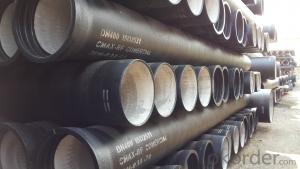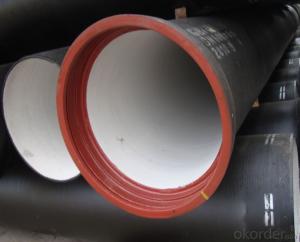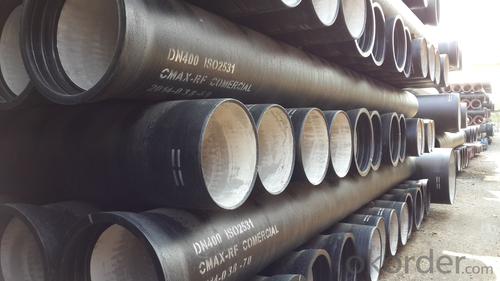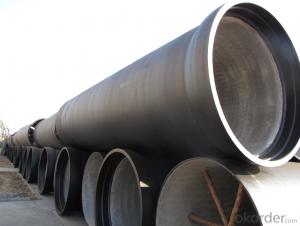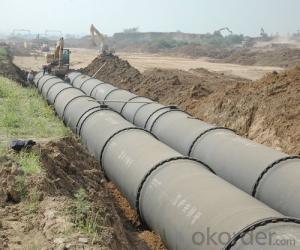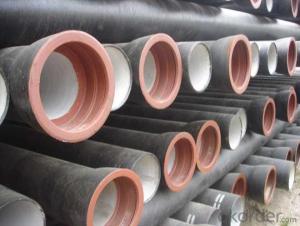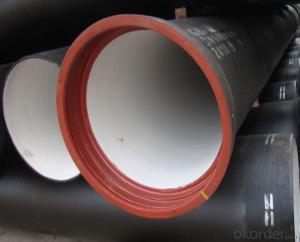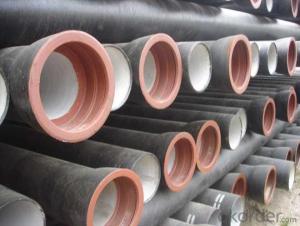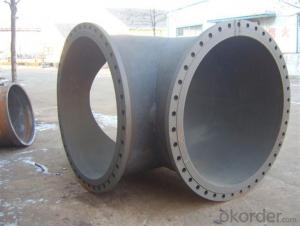Ductile Iron Pipe of China DN600 EN545 On Chip Price
- Loading Port:
- China main port
- Payment Terms:
- TT or LC
- Min Order Qty:
- 25 m.t.
- Supply Capability:
- 100000 m.t./month
OKorder Service Pledge
OKorder Financial Service
You Might Also Like
1,Ductile Iron Pipe Description :
1) Pipes confirm to ISO2531,K9 class,T type joint,6m long,with inside cements lining conform to ISO4179, outside Zinc spraying(130g/m2) and bitumen coating(70μm) conform to ISO8179.
2) Pipe ends: Spigot and socket ends, with 100% SBR rubber gaskets accoding to ISO4633
3) we can do third party inspection according to customer's request.
4) Our products have been sold to many international market,such as Middle East and South East Asia and Africa.
2,Main Features of the Ductile Iron Pipe:
·High yield strength
·High tensile Strength
·High corrosion resistance
·Pressure Resistence
·Anti-corrosion
·Installation is convenient
·Satisfy the highest hygienic standards
. Material: Ductile iron grade 500-7/ 450-10 in accordance with ISO1083
. Standard: ISO 2531, EN545, EN598, ANSI, AWWA
3,Ductile Iron Pipe Images:
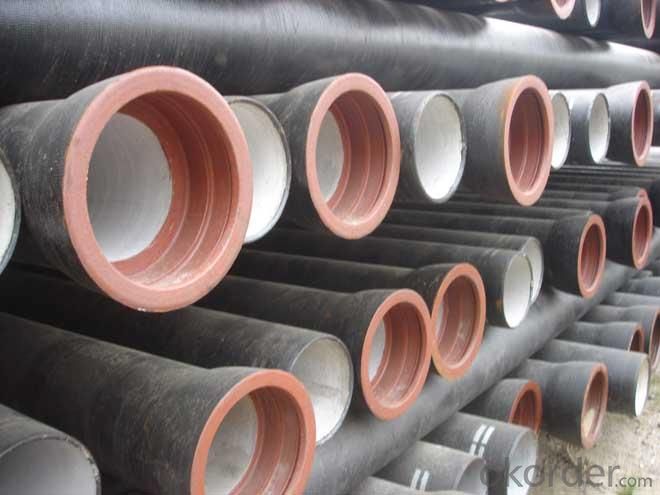
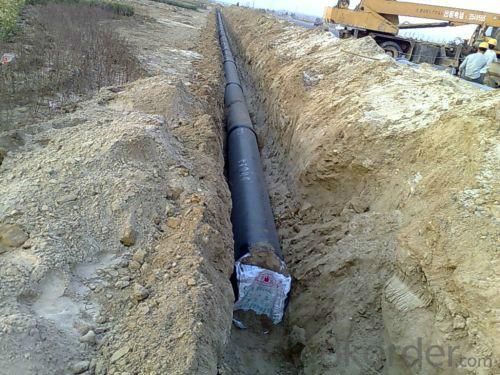
4. Ductile Iron Pipe Specification
Surface Finishes:Bare, Oiled, Mill Varnish, Galv,FBE, FBE Dual, 3LPE, 3LPP, Coal Tar,Concrete Coating and Tape Wrap
End Finishes: Beveled, Square Cut, Threaded, hat
Additional Services: Internal Coating
Packaging: packed in bag, plastic bag, steel strip, steel wire,double wire, iron box, wooden box,
tarpaulin, plastic sheeting
Inspection: MOODY SGS BV GL DNV ABS LIOYD’S
Test :X-ray, UT, magnetic particle,inspection,hydrostatic test.
Processing service :Beveling, Threading, Slotting, Cut-to length, Bends, Quench and Temper, Fabrication, Double-jointing and On-site assistance
Documentary MTC: material certification,Origin certification, CI or PI,Test Report, export licence, handling order, B/L,insurance policy,shipping instructions, contract, packing list etc.
5.FAQ:
We have organized several common questions for our clients,may help you sincerely:
1.Q: Why would you choose ductile iron pipe rather than other pipe materials?
A:The reasons are obvious for that not only ductile iron pipe possesses the inherent strength and flexibility of ductile iron, combined with proven corrosion protection systems, but also the cost savings can be achieved from design to installation and commissioning.
2.Q:Why can you guarantee the inner of pipes can’t be corroded?
A: High alumina cement mortar lining and sulphate-resistant cement mortar lining. These two special linings are applicable to inner anti-corrosion for sewage pipes, improving resistance to erosion of the sewage components.
- Q: How do ductile iron pipes perform in sandy soil conditions?
- Ductile iron pipes perform well in sandy soil conditions due to their inherent strength and durability. The material's high tensile strength allows it to withstand the pressure exerted by the surrounding soil, preventing pipe deformation and breakage. Additionally, the corrosion resistance of ductile iron ensures a longer lifespan, even in corrosive sandy soil environments.
- Q: Can ductile iron pipes be used for underground oil and gas pipelines?
- Yes, ductile iron pipes can be used for underground oil and gas pipelines. Ductile iron is a strong and durable material that can withstand the high pressure and corrosive nature of oil and gas transportation. It has excellent tensile strength and impact resistance, making it suitable for underground applications. Ductile iron pipes are also resistant to external loads, which is important for underground pipelines that may be subject to soil movement or heavy traffic. Furthermore, ductile iron pipes can be easily jointed, allowing for efficient installation and maintenance. However, it is important to consider factors such as soil conditions, environmental factors, and specific project requirements before choosing ductile iron pipes for underground oil and gas pipelines.
- Q: What's the advantage of FCD50 ductile iron?
- The threading pipe threading pipe application of flame retardant PVC line pipe, the pipe wall surface should be smooth, the wall thickness required was not broken finger pinch strength, but also should have the certificate. You can also use the national standard galvanized pipe as threading pipe.
- Q: What are the different methods for repairing ductile iron pipe?
- Repairing ductile iron pipes can be done using various methods, which depend on the extent and location of the damage. One popular approach involves the utilization of repair clamps or couplings. These clamps or couplings, typically constructed from stainless steel, are designed to effectively seal off and prevent further leakage from leaks or cracks in the pipe. They can be used as a temporary or permanent solution. Another option is the application of epoxy lining or patching. This method entails the use of a specialized epoxy material that forms a protective barrier on the inside of the pipe, effectively covering the damaged area. It is particularly suitable for smaller cracks or leaks and offers a durable solution. In cases where the damage is more severe, such as the presence of large cracks or fractures, it may be necessary to remove and replace the damaged section of the pipe. This process involves excavating the surrounding area, eliminating the damaged part, and installing a new section of ductile iron pipe. Alternatively, trenchless repair methods can be employed. These advanced techniques, including pipe bursting or cured-in-place pipe lining, allow for pipe repair without extensive excavation. Not only can these methods be more cost-effective, but they also cause less disruption compared to traditional repair approaches. It is important to consider the extent of the damage, the pipe's location, and the available resources and expertise when selecting a specific repair method for ductile iron pipes. Seeking guidance from a professional pipe repair service is advised to determine the most appropriate approach for a particular repair situation.
- Q: What are the different types of joints used with ductile iron pipe?
- There are several different types of joints that can be used with ductile iron pipe. These joints are designed to provide a secure and watertight connection between sections of pipe. Some of the most common types of joints used with ductile iron pipe include: 1. Mechanical Joint: This is the most commonly used joint for ductile iron pipe. It consists of a gland and a follower which are tightened using bolts and nuts to provide a tight seal. Mechanical joints are flexible and can accommodate slight misalignments. 2. Push-On Joint: This type of joint does not require any bolts or nuts. It is designed to be easily assembled by simply pushing the pipe sections together. A rubber gasket is used to provide a watertight seal. 3. Restrained Joint: Restrained joints are specifically designed for applications where pipe movement needs to be limited. These joints typically include a mechanical joint with additional features such as thrust collars or tie rods to prevent axial movement. 4. Flanged Joint: Flanged joints are commonly used for larger diameter pipes. The pipe ends are flanged and then bolted together, with a gasket placed in between to create a leak-proof connection. Flanged joints are typically used in applications where frequent disassembly and reassembly may be required. 5. Welded Joint: In some cases, ductile iron pipe sections may be welded together using a fusion welding process. This creates a permanent and strong joint. Welded joints are commonly used in high-pressure applications where a reliable and durable connection is required. It is important to note that the choice of joint type will depend on the specific requirements of the project, such as the pipe diameter, pressure rating, and the nature of the fluid being transported. Additionally, local regulations and standards may also dictate the type of joint that should be used in certain applications.
- Q: Can ductile iron pipes be used for wastewater pumping stations?
- Indeed, wastewater pumping stations can utilize ductile iron pipes. With their remarkable strength and durability, ductile iron pipes are well-suited for transporting wastewater and effectively managing the immense pressures and corrosive properties of sewage. Furthermore, the smooth interior surface of ductile iron pipes prevents blockages and facilitates the efficient flow of wastewater. Moreover, these pipes exhibit resistance towards external forces like soil displacement or heavy vehicular movement, thereby establishing themselves as a dependable option for wastewater pumping stations.
- Q: Are ductile iron pipes resistant to chloride-induced corrosion?
- Yes, ductile iron pipes are generally resistant to chloride-induced corrosion due to their protective coating and inherent chemical composition. However, the level of resistance may vary depending on the specific environment and concentration of chlorides present. Proper maintenance and regular inspections are still important to ensure long-term durability and prevent any potential corrosion issues.
- Q: How does ductile iron pipe compare to steel pipe in terms of durability?
- Ductile iron pipe is generally considered to be more durable than steel pipe. It has superior strength and durability due to its unique microstructure, which allows it to withstand higher levels of pressure, impacts, and loads. Ductile iron pipe also has better corrosion resistance properties, making it less prone to rust and deterioration compared to steel pipe. Additionally, ductile iron pipe has a longer lifespan and requires less maintenance, making it a more reliable and durable choice for various applications.
- Q: Can ductile iron pipe be used for oil and gas transmission pipelines?
- Yes, ductile iron pipe can be used for oil and gas transmission pipelines. It offers excellent strength, durability, and corrosion resistance, making it suitable for the transportation of various fluids, including oil and gas. However, other factors such as specific project requirements, operating conditions, and regulatory standards should also be considered before making a final decision.
- Q: Can ductile iron pipes be used for irrigation systems in agricultural fields?
- Yes, ductile iron pipes can be used for irrigation systems in agricultural fields. Ductile iron is known for its durability, corrosion resistance, and ability to withstand high pressure, making it suitable for transporting water in agricultural irrigation systems.
Send your message to us
Ductile Iron Pipe of China DN600 EN545 On Chip Price
- Loading Port:
- China main port
- Payment Terms:
- TT or LC
- Min Order Qty:
- 25 m.t.
- Supply Capability:
- 100000 m.t./month
OKorder Service Pledge
OKorder Financial Service
Similar products
Hot products
Hot Searches
Related keywords
